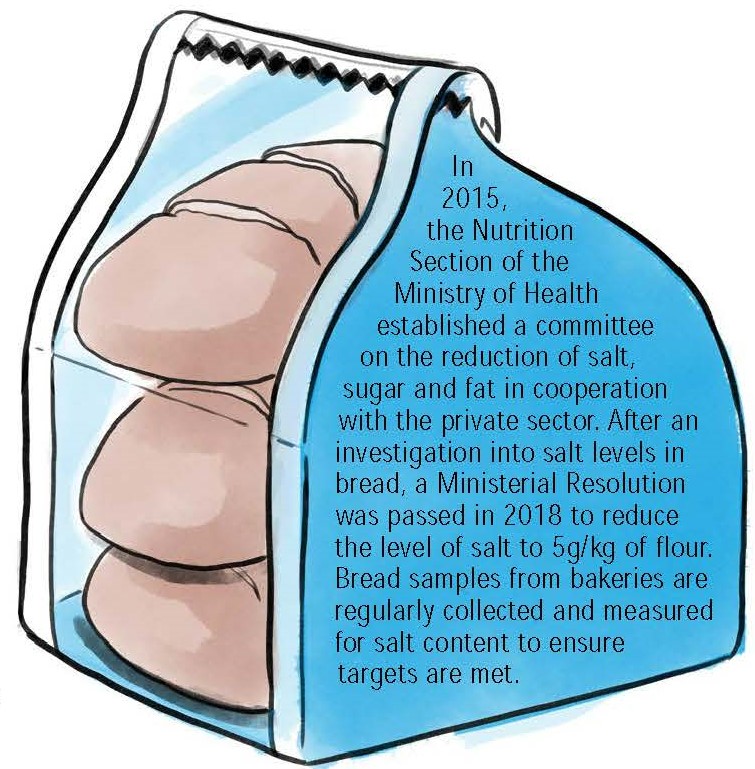World Health Organization. Regional Office for the Eastern Mediterranean
Improving service provision for people living with NCDs in occupied Palestinian territory: Lessons from the COVID-19 pandemic
04 Oct 2023
World Health Organization. Regional Office for the Eastern Mediterranean | 10 Sep 2023
Nutrition and tobacco use are two major risk areas for noncommunicable diseases (NCDs). This section highlights Bahrain’s commitment to identifying and reducing public health threats posed by unhealthy eating, lifestyle and tobacco use. The country has been a trailblazer in some areas of tobacco policy and has taken forward-thinking action during the pandemic to protect its citizens.
 In 2018, a Ministerial Resolution reinforced the existing legislation on the use, marketing and promotion of breast milk substitutes.
In 2018, a Ministerial Resolution reinforced the existing legislation on the use, marketing and promotion of breast milk substitutes.
A range of initiatives are targeting internationally-acknowledged dangers to public health including trans fats, energy drinks and foods that are high in fat or salt.
In 2020, Bahrain collaborated with WHO in drafting guidelines for healthy eating and living, using Bahraini slang to encourage better eating and cooking habits.
Between 2008 and 2018, the Ministry of Health set up five nutrition centres to identify, evaluate and treat obesity and excess weight in adults and adolescents.
Bahrain has implemented a comprehensive ban on tobacco advertising, promotion and sponsorship (TAPS). The ban’s implementation has been strictly monitored and compliance data shows it is effective.
Since introducing health warning labelling on all types of tobacco packaging in 2009, Bahrain has steadily increased the size and severity of these warnings.
In 2011, Bahrain banned tobacco advertising, promotion and sponsorship (TAPS) across all media channels including TV, radio, print media, online and social media. It also prohibited discount offers or free samples as well as advertising and promotion at point of sale.
The key to the ban’s success has been the strict monitoring of its implementation and the prosecution of violators. However, monitoring social media has been a challenge, which has led to a collaboration between the Ministry of Health and the Cyber Crimes Directorate in the Ministry of Interior to stop online violations.
Health warnings on tobacco packaging have also played a major role in Bahrain’s tobacco control strategy since they were introduced in 2009. Bahrain and other countries of the GCC worked together through the GCC Standardization Organization to develop the GSO 246/2011 regulation on the labelling of tobacco product packages. This led to Bahrain requiring pictorial health warnings for all tobacco product packaging in 2012. Implementation and enforcement of the new requirement was overseen by the Ministry of Health, the Ministry of Interior (Customs Directorate) and the Ministry of Industry and Commerce.
Bahrain is currently considering plans either to upgrade the size of pictorial health warnings to cover 70% of both front and back display areas of tobacco product packaging, or to implement plain packaging in line with Saudi Arabia.
These tobacco control policies helped give impetus to the March 2020 ban on the public use of waterpipes, with heavy fines for businesses that violated the ban. This was followed by a Ministry of Trade ban on the home delivery of all tobacco products, including waterpipes, in April 2020. The Ministry of Health supported these bans with a campaign linking tobacco use to the transmission of COVID-19. Bahrain plans to continue prohibiting public waterpipe use beyond the COVID-19 pandemic.
Bahrain has recognized the essential role that good nutrition can play in reducing or preventing the development of NCDs, especially if addressed early in life.
For this reason, the country has adopted a range of controls and legislation including:
This country story is part of a series on sharing successful strategies from the Eastern Mediterranean Region mitigating noncommunicable diseases and mental health disorders during the COVID-19 pandemic and beyond. Discover additional stories and insights in the full report published by the World Health Organization Regional Office for the Eastern Mediterranean.